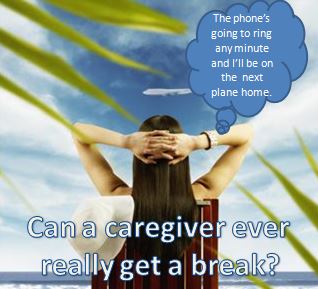
Many of us equate summer time with vacations. But, for a lot of caregivers there have been no vacations…maybe for a long time. Caregiving can be stressful in many ways, but never being able to take a break from the responsibilities is especially detrimental. Social isolation and hopelessness in caregiving can lead to serious health risks. Here we share some of the hard evidence of these effects, as well as realistic tips for how you might be able to take a break.
Studies on caregiving have shown that:
- Family caregivers are more likely to have symptoms of depression and anxiety (National Women’s Health Information Center). 40-70% of caregivers have significant symptoms of clinical depression (Family Caregiver Alliance).
- Caregivers tend to have a weaker immune response to flu and colds and slower wound healing. Caregivers have even been shown to have higher mortality rates. (American Psychological Association)
- Social isolation for caregivers has been shown to have similar negative impacts to the risk factors of smoking (The Gerontologist, 2006).
When you’re in the midst of caregiving, it can be frustrating to hear these statistics and read articles telling you that you need to take a break and take care of yourself. You probably know that, but you are just trying to do your best. You might dream of lying on the beach undisturbed, but in reality you picture your cell phone ringing with some disaster awaiting at the other end. Our caregiver respite tips are intended to give you some specific ideas for making a break possible. We hope they help, and we welcome your comments and ideas as well!
Senior caregiver respite tips:
- Test it out first. Try using a respite caregiver once/week so you can get out and run some errands or do something for yourself, while still close to home. Perhaps try having another family member come to stay while you take a half-day to attend a local event or take care of some items on your to-do list.
- Consider what’s comfortable for you (in other words, don’t get overambitious if it’s your first break in a while). First, you might feel comfortable with a shorter period of being away, or being somewhere that you know is relatively accessible. Second, you may be exhausted, so don’t over plan or schedule a trip with a lot of activity or little rest time. If you have jet lag when you return, you might undo a lot of the benefits of your trip.
- Give yourself the peace of mind of being over prepared. Give more information than you think is necessary to the substitute caregivers who are helping. Create a notebook or online care profile with medical background, schedule/important reminders, key contact information and even little things that may come up day-to-day.
- Mentally prepare for your break. Talk to your support systems about how you are feeling and your worries. If you attend a support group, they can be a great resource for encouraging you to take the break and giving you pointers. You may have to talk through things to let go of some of your worries. No one else will provide care exactly the way you do, but that doesn’t mean your loved one can’t be well taken care of with the help of others.
- Do due diligence when hiring respite care. There are different options for hired respite care, from a temporary stay at an assisted living or nursing facility to adult day care or hiring in-home caregivers. Look at costs and other factors, such as familiarity of environment and the types of assistance/time frame needed. Get recommendations and ask a lot of questions. Does the provider seem to value your input and ask you sufficient questions about your needs and how to care for your loved one?
- Consider hiring a geriatric care manager to be your advocate while you are away. You will need to arrange this beforehand so that the care manager can be prepared to assist. A geriatric care manager can oversee care providers, check in regularly, attend doctor’s appointments and even handle urgent situations that arise.
For more tips on caregiver breaks, you can download our Respite Care Checklist.
EasyLiving provides respite care for caregivers with loved ones in Pinellas and Pasco counties in Florida. We provide home health care, companions, medication management, transportation and more. We can help short-term or on a regular basis, for as little as a few hours through 24/7 care. Contact us at 727-448-0900 for respite care or senior care assistance and questions.







